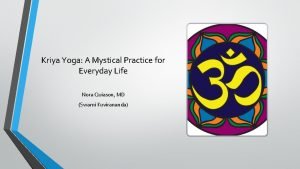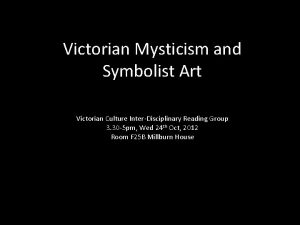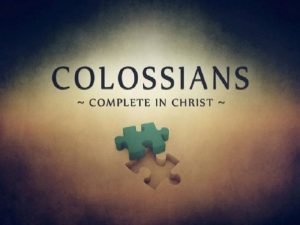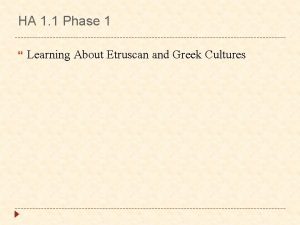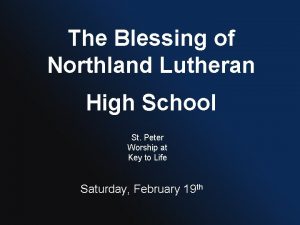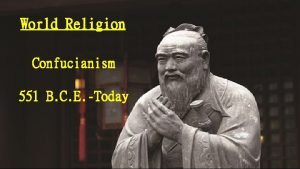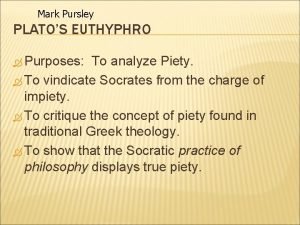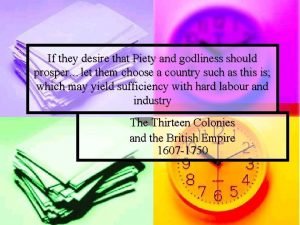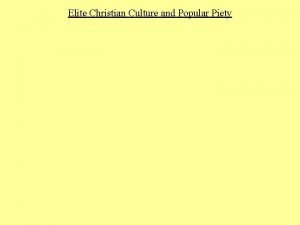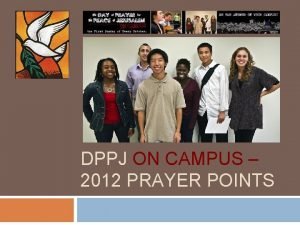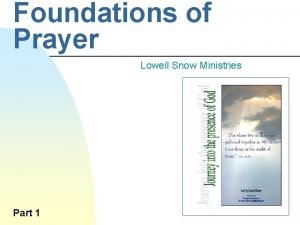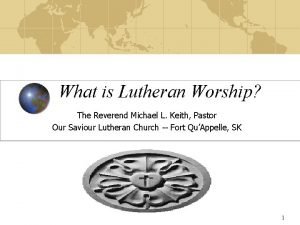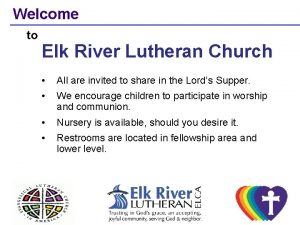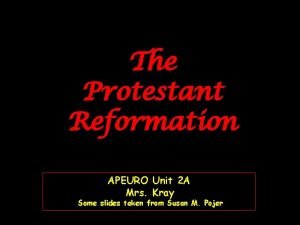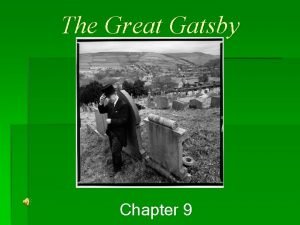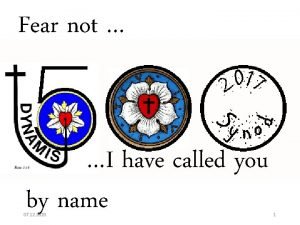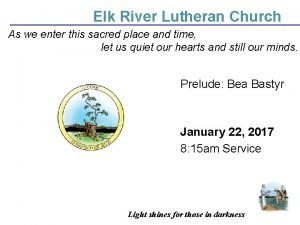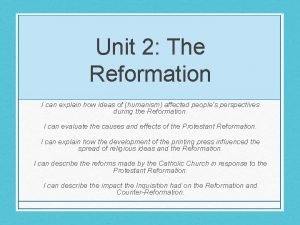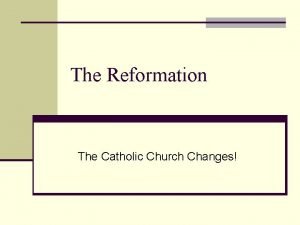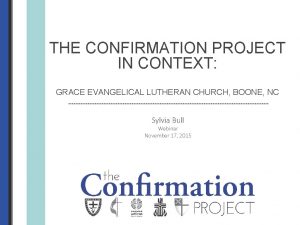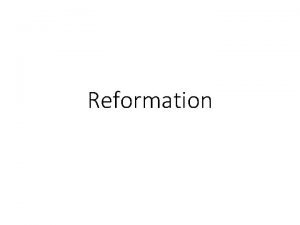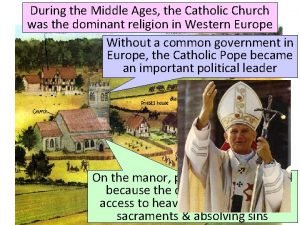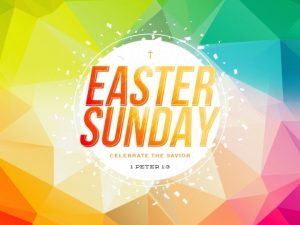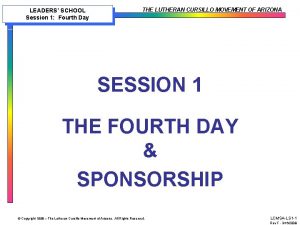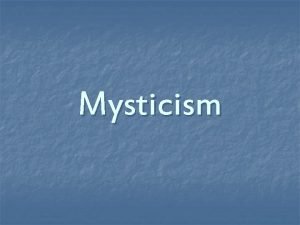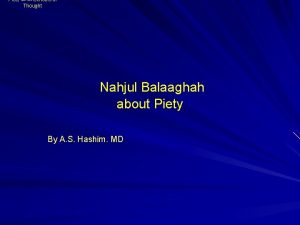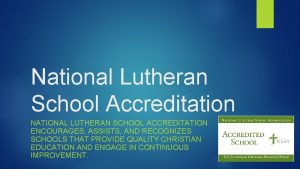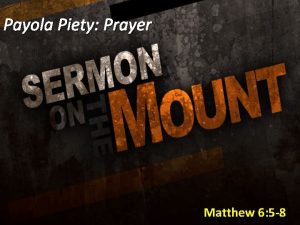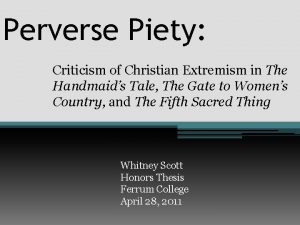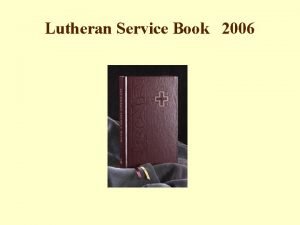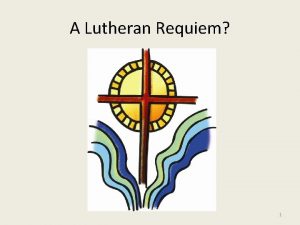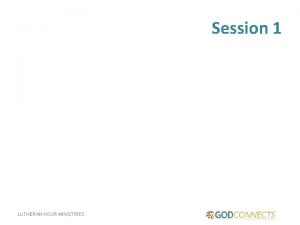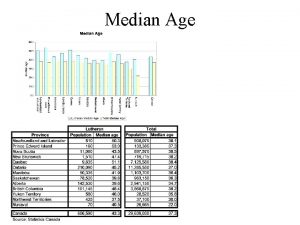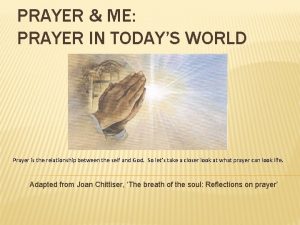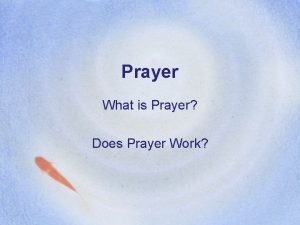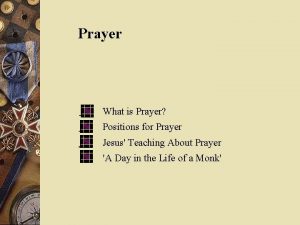Lutheran Piety Christian Mysticism School of Prayer Presented








































- Slides: 40

Lutheran Piety Christian Mysticism School of Prayer Presented by David Schütz

Ein’ Feste Burg ist Unser Gott u u Ein' feste Burg ist unser Gott, Ein gute Wehr und Waffen; Er hilft uns frei aus aller Not, Die uns jetzt hat betroffen. Der alt' böse Feind, Mit Ernst er's jetzt meint, Groß' Macht und viel List Sein' grausam' Rüstung ist, Auf Erd' ist nicht seingleichen. A mighty fortress is our God, A trusty shield and weapon, Our faithful helper in all need, Our stay, whate’er may happen, The old evil foe Now means deadly woe; Deep guile and great might Are his dread arms fight; On earth is not his equal.

Ein’ Feste Burg ist Unser Gott u u Mit unsrer Macht ist nichts getan, Wir sind gar bald verloren; Es steit't für uns der rechte Mann, Den Gott hat selbst erkoren. Fragst du, wer der ist? Er heißt Jesu Christ, Der Herr Zebaoth, Und ist kein andrer Gott, Das Feld muß er behalten. With might of ours can naught be done, Soon were our fall effected; But for us fights the righteous Man, Whom God himself elected. Ask ye: Who is this? Christ Jesus it is, Of Sabaoth Lord, And there’s none other God; He holds the field for ever.

Ein’ Feste Burg ist Unser Gott u u Und wenn die Welt voll Teufel wär' Und wollt' uns gar verschlingen, So fürchten wir uns nicht so sehr, Es soll uns doch gelingen. Der Fürst dieser Welt, Wie sau'r er sich stellt, Tut er uns doch nicht, Das macht, er ist gericht't, Ein Wörtlein kann ihn fällen. Though devils all the world should fill, All eager to devour us, We tremble not, we fear no ill, They shall not overpower us. This world’s prince may still Scowl fierce as he will, He can harm us none; He’s judged, for e’er undone; One little word can fell him.

Ein’ Feste Burg ist Unser Gott u u Das Wort sie sollen laßen stahn Und kein'n Dank dazu haben; Er ist bei uns wohl auf dem Plan Mit seinem Geist und Gaben. Nehmen sie den Leib, Gut, Ehr', Kind und Weib: Laß fahren dahin, Sie haben's kein'n Gewinn, Das Reich muß uns doch bleiben. The Word shall stand despite all foes-No thanks they for it merit, For God is with us, and bestows His gifts and Holy Spirit. And take they our life, Goods, fame, child, and wife: Though these all be gone, Yet have our foes not won; The kingdom ours remaineth.

Martin Luther u u u Martin Luther was born in 1483, and died in 1546. An Augustinian Monk (1505), ordained priest (1507) Professor of Old Testament at the new Wittenberg University (1508) Doctor of Theology (1512) In 1517 he called for a debate on the practice of the sale of indulgences (“The 95 Theses”), after which his questioning of some of the practices and teachings of the Church escalated

Martin Luther u u u Excommunicated by Pope Leo X in June 1520 in the bull “Exsurge Domine”, Luther responded with “The Babylonian Captivity of the Church” in October 1520. Appeared before the Emperor Charles V at the Diet of Worms in 1521 at which he was condemned. 1525 “On the Bondage of the Will” in answer to Erasmus’ 1524 “On the Freedom of the Will”

Martin Luther u u u After the 1525 Peasants War he parted company with the more radical elements of the reformation movement Married in 1525 to ex-nun Katherine Von Bora and living in the old monastery in Wittenberg, (now vacant!) had six children After 1525 Luther gave himself to the task of overseeing the new “evangelical” churches (with aid from his close friends Melanchthon and Bugenhagen)

Martin Luther u u u u u 1522 German New Testament 1526 Deutsche Messe 1527 Marburg Colloquy with Zwingli 1528 Great Confession on the Lord’s Supper 1529 Small & Large Catechisms 1530 Augsburg Confession 1534 Complete German Bible Many many hymns, books, commentaries, sermons, tracts (Weimar edition = 127 volumes) Died while travelling in 1546

Luther’s Spiritual Heritage u u Luther was an Augustinian, never sympathetic to Aristotelian scholasticism (eg. Thomas Aquinas) Very positive reaction to St Bernard of Clairvaux In 1508 Luther bought an edition of the sermons of the mystical Dominican theologian Johannes Tauler’s (which he thoroughly annotated in the margins) Luther’s first published book in 1516 was Eyn geystlich edles Buchleynn

Theologia Germanica u u Eyn geystlich edles Buchleynn (1516) is a German edition and translation of a handwritten manuscript that came into Luther’s possession An anonymous work, which Luther believed was written by “the illumined Doctor Tauler of the Preaching Order”. 1518 (following “ 95 Theses”) Luther discovered a more complete manuscript of the same work in the library of the Erfurt Carthusian monastery. Published under the title “Theologia Germanica”: “German Theology”.

From the Theologia Germanica “Even if God would take to himself all humans in the world and become humanised in them and they would become divinised in him and this did not happen in me, my fall and my apostasy would never be amended. No, it must also occur in me. ” Ch. 3 u “But if our inner being would make a leap into the Perfect, one would find and taste that the Perfect is limitlessly, endlessly, insuperably nobler and better than all imperfect and incomplete things. That inner being of ours would also find the Eternal above the transitory and the wellspring and origin underneath everything that flows from it and ever will flow from it. ” Ch. 6 u

Luther the Mystic? u u u Louis Bouyer (Spirit and Forms of Protestantism, 1956): “It is absolutely certain, as a matter of history, that the intuition of Luther…takes us back directly to the Rhenish school of mysticism originated by Eckhart and Tauler. ” “If Luther had no hesitation in acknowledging his debt to the Theologia Germanica…if he went so far as to translate it into German to popularise it, that shows that he recognised it as one of the sources of his conception. The God whose very light is a ‘superessential darkness’ is the Deus revelatus, but revelatus as absconditus. ”

Luther the Mystic? u u Bengt R. Hoffman Theology of the Heart: The Role of Mysticism in the Theology of Martin Luther (1986, 1998) regarded as a theologian of “personal mysticism” Infinity Mysticism (eg. Eckhardt) = “an experience of the superhuman beyond the vicissitudes of life …an immersion in nature and exercise according to technical patterns …a dissolution of the person into the impersonal Beyond …” Personality Mysticism (eg. Tauler) = “an experience of God in the midst of life’s problems …an experience of the human ‘I’ meeting the divine ‘Thou’ …trust and forgiveness in this life… a relationship to a personal God” (Nb. The “Finnish School”: Theosis in Luther’s theology)

Key themes in Luther’s Spirituality u u u u The “Solas”: Sola Gratia, Sola Fide, Solus Christus, Sola Scriptura Anthropology: Simul justus et peccator Dialectic: Law/Gospel, Deus Absconditus/Deus Revelatus Theologia Crucis The Incarnation: focused on the “crib and cross” finitum capax infinitum Christocentricism (“Was Christum treibet”, “ist kein andrer Gott”) Word and Sacrament Sin, Death & the Devil

Vom Himmel hoch u u 1. Vom Himmel hoch da komm ich her, Ich bring' euch gute neue Mähr, Der guten Mähr bring ich so viel, Davon ich sing'n und sagen will. 1. "From heaven above to earth I come To bear good news to every home; Glad tidings of great joy I bring, Whereof I now will say and sing:

Vom Himmel hoch u u 2. Euch ist ein Kindlein heut' gebor'n Von einer Jungfrau auserkor'n, Ein Kindelein so zart und fein, Das soll eu'r Freund Wonne sein. 3. Es ist der Herr Christ unser Gott, Der will euch führ'n aus aller Noth, Er will eu'r Heiland selber sein, Von allen Sünden machen rein. 2. "To you this night is born a child Of Mary, chosen virgin mild; This little child, of lowly birth, Shall be the joy of all the earth. 3. "This is the Christ, our God and Lord, Who in all need shall aid afford; He will Himself your Savior be From all your sins to set you free.

Vom Himmel hoch u u 4. Er bringt euch alle Seligkeit, Die Gott der Vater hat bereit't, Daß ihr mit uns im Himmelreich Sollt leben nun und ewiglich. 5. So merket nun das Zeichen recht, Die Krippen, Windelein so schlecht; Da findet ihr das Kind gelegt, Das alle Welt erhält und trägt. 4. "He will on you the gifts bestow Prepared by God for all below, That in His kingdom, bright and fair, You may with us His glory share. 5. "These are the tokens ye shall mark: The swaddlingclothes and manger dark; There ye shall find the Infant laid By whom the heavens and earth were made. "

Vom Himmel hoch u u 6. Deß laßt uns Alle fröhlich sein Und mit den Hirten geh'n hinein, Zu seh'n was Gott uns hat beschert, Mit seinem lieben Sohn verehrt. 13. Ach, mein herzliebes Jesulein, Mach dir ein rein sanft Bettelein, Zu ruhen in mein's Herzens Schrein, Daß ich nimmer vergesse dein. 6. Now let us all with gladsome cheer Go with the shepherds and draw near To see the precious gift of God, Who hath His own dear Son bestowed. 13. Ah, dearest Jesus, holy Child, Make Thee a bed, soft, undefiled, Within my heart, that it may be A quiet chamber kept for Thee.

Vom Himmel hoch u u 14. Davon ich allzeit fröhlich sei, Zu springen, singen immer frei Das rechte Susannine schon, Mit Herzen Lust den süßen Ton. 15. Lob, Ehr sei Gott im höchsten Thron, Der uns schenkt seinen ein'gen Sohn, Des freuen sich der Engel Schaar Und singen uns solch's neues Jahr. 14. My heart for very joy doth leap, My lips no more can silence keep; I, too, must sing with joyful tongue That sweetest ancient cradle-song: 15. Glory to God in highest heaven, Who unto us His Son hath given! While angels sing with pious mirth A glad new year to all the earth.

Law and Gospel u u u In the scriptures, two things are to be distinguished–the commands and the promises. … The righteousness of the Law is earthly, it is concerned with earthly works… The heavenly passive righteousness does not spring from our own efforts… We do not produce it: we receive it by faith. A Christian is a perfectly free lord of all, subject to none; a Christian is a perfectly dutiful servant of all, subject to all.

Grace and Faith u u u If you believe, you already have God; if you do not believe, you do not have him. To have faith is to have God. If you desire to fulfil the law and overcome concupiscence, believe in Jesus Christ, in whom you are offered grace, justice, peace and liberty. By faith, you possess all these; without it, you are a stranger to them all. ” Grace gives, faith receives. Thus, since all salvation is by grace, all salvation is by faith.

Faith and Works u u In the Law many works are enjoined, and all external, but in the gospel there is only one, an internal work, and that is faith. It will now be seen how it is impossible to separate works from faith, as impossible as it is to separate burning and shining from fire

Christ u u u Christ is the object of faith, nay rather, not the object, but if it may be said, the subject, the One present and active in faith itself. The whole of Scripture deals with Christ, from beginning to end One should think of no other God than Christ. The god who does not speak through Christ is no God at all.

Sinner and Saint u u The righteousness of God is not acquired by acts frequently repeated, as Aristotle taught, but is imparted by faith. He is at one and the same time always in sin, in justification, in righteousness. Always a sinner, always penitent, always right with God.

God hidden and revealed u u u No faith in, no knowledge of, and no understanding of God, in so far as he is not revealed, are possible…the unrevealed God defies human investigation Nevertheless the hidden God is none the less the revealed God, so that we may know him and apprehend him as our God. Faith alone is able, under trial, to hear the deep secret “Yes” of God beneath and above his “No”.

The “Theology of the Cross” u u u A theologian of glory calls evil good and good evil. A theologian of the cross calls the thing what it actually is. God wished to be recognized in suffering, …it is not sufficient for anyone, and it does him no good, to recognize God in his glory & majesty, unless he recognizes him in the humility & shame of the cross. He who does not know Christ does not know God hidden in suffering… God can be found only in suffering and the cross.

“Gott sei gelobet” Gott sei gelobet und gebenedeiet, Der uns selber hat gespeiset. Mit seinem Fleische und mit seinem Blute, Das gib uns, Herr Gott, zugute! Kyrieleison! Herr, durch deinen heiligen Leichnam, Der von deiner Mutter Maria kam, Und das heilige Blut Hilf uns, Herr, aus aller Not! Kyrieleison! O Lord, we praise thee, bless thee and adore thee, In thanksgiving bow before thee. Thou with thy body and thy blood didst nourish our weak souls that they may flourish. O Lord, have mercy. By thy body, pure as none other, born of Mary, thy virgin mother, by thy blood, for us shed, help us in the hour of need. O Lord, have mercy.

The Small Catechism The Ten Commandments u The Apostles Creed u The Lords Prayer u The Sacrament of Baptism u Confession and Absolution u The Sacrament of the Altar u The Table of Duties u

The Small Catechism I believe in God, the Father Almighty, Maker of heaven and earth. What does this mean? I believe that God has made me and all creatures; that He has given me my body and soul, eyes, ears, and all my members, my reason and all my senses, and still takes care of them. He also gives me clothing and shoes, food and drink, house and home, wife and children, land, animals, and all I have. He richly and daily provides me with all that I need to support this body and life. He defends me against all danger and guards and protects me from all evil. All this He does only out of fatherly, divine goodness and mercy, without any merit or worthiness in me. For all this it is my duty to thank and praise, serve and obey Him. This is most certainly true.

The Small Catechism And in Jesus Christ, His only Son, our Lord, etc. …From thence He will come to judge the living and the dead. What does this mean? I believe that Jesus Christ, true God, begotten of the Father from eternity, and also true man, born of the Virgin Mary, is my Lord, who has redeemed me, a lost and condemned person, purchased and won me from all sins, from death, and from the power of the devil; not with gold or silver, but with His holy, precious blood and with His innocent suffering and death, that I may be His own and live under Him in His kingdom and serve Him in everlasting righteousness, innocence, and blessedness, just as He is risen from the dead, lives and reigns to all eternity. This is most certainly true.

The Small Catechism I believe in the Holy Spirit, the holy Christian church, the communion of saints, the forgiveness of sins, the resurrection of the body, and the life everlasting. Amen. What does this mean? I believe that I cannot by my own reason or strength believe in Jesus Christ, my Lord, or come to Him; but the Holy Spirit has called me by the Gospel, enlightened me with His gifts, sanctified and kept me in the true faith. In the same way He calls, gathers, enlightens, and sanctifies the whole Christian church on earth, and keeps it with Jesus Christ in the one true faith. In this Christian church He daily and richly forgives all my sins and the sins of all believers. On the Last Day He will raise me and all the dead, and give eternal life to me and all believers in Christ. This is most certainly true.

“A Simple Way to Pray” u u The Catechism was the basis for one of Luther’s best known works on prayer “A Simple Way to Pray” (1535) Peter Beskendorf, a Wittenberg barber, though a devout Christian, had killed his son-in-law in a drunken rage. By Luther’s intercession he was exiled rather than executed. Peter the Barber asked Luther for help in how to pray. Luther responded: “I will tell you as best I can what I do personally when I pray. May our dear Lord grant to you and to everybody to do it better than I! Amen. ”

“A Simple Way to Pray” Some significant and practical pastoral advice: u u u u “when I feel that I have become cool and joyless in prayer…” “my room…or where a congregation is assembled…” “word-for-word the Ten Commandments, the Creed, …some words of Christ or of Paul. or some psalms” “just as a child might do. ” “the first business of the morning and the last at night” “‘Wait a little while. I will pray in an hour; first I must attend to this or that. ’ …nothing comes of prayer for that day. ” “St. Jerome “He who works faithfully prays twice. ’ Yet we must be careful not to break the habit of true prayer and imagine other works to be necessary which, after all, are nothing of the kind. ”

“A Simple Way to Pray” u u Luther then provides a series of model meditations on the Our Father, the Ten Commandments and the Creed—literally a “prayed catechism”. “You should also know that I do not want you to recite all these words in your prayer. …Rather do I want your heart to be stirred and guided concerning the thoughts which ought to be comprehended in the Lord’s Prayer. These thoughts may be expressed, if your heart is rightly warmed and inclined toward prayer, in many different ways and with more words or fewer. …If an abundance of good thoughts comes to us we ought to disregard the other petitions, make room for such thoughts, listen in silence, and under no circumstances obstruct them. The Holy Spirit himself preaches here, and one word of his sermon is far better than a thousand of our prayers. ”

“A Simple Way to Pray” u u Priests: “Like the priest who prayed, “Deus in adjutorium meum intende. Farmhand, did you unhitch the horses? Domine ad adjuvandum me festina. Maid, go out and milk the cow. Gloria patri et filio et spiritui sancto. Hurry up, boy, I wish the ague would take you!”” Barbers: “So, a good and attentive barber keeps his thoughts. attention, and eyes on the razor and hair and does not forget how far he has gotten with his shaving or cutting. If he wants to engage in too much conversation or let his mind wander or look somewhere else he is likely to cut his customer’s mouth, nose, or even his throat. Thus if anything is to be done well, it requires the full attention of all one’s senses and members…. How much more does prayer call for concentration & singleness of heart if it is to be a good prayer!”

Oratio Meditatio Tentatio 1539: In the preface to the first edition of Luther’s works, Luther points out “a correct way of studying theology” with three steps: Oratio, Meditatio, and Tentatio. u a form of “Lectio Divina”, familiar to Luther from his monastic days, also fitted his sola scriptura spirituality u “Everything centres around the practice of meditation, for prayer prepares for it and its results are confirmed in the experience of conflict. For Luther, meditation is the key to the study of theology. No one can become a true theologian unless he learns theology through it [ie. through meditation]. " (John Kleinig) u

Oratio Meditatio Tentatio Oratio: u “Prayer”, but prayer focused on the Scriptures, “a book which turns the wisdom of all other books into foolishness” u Prayer is the necessary preparation and method for reading the scriptures: “Teach me, Lord, instruct me, lead me, show me…” – the prayer of an open heart u “Reason and understanding” are useless and presumptuous; “humility & earnestness”, with the gift of the Holy Spirit, are necessary for enlightenment

Oratio Meditatio Tentatio Meditatio: u Note the emphasis on meditating “not only in your heart, but also externally”, ie. reading the text aloud (or soto voce) u Luther was a Hebrew scholar and knew that the word used in Psalm 119 for “meditate” carried the inherent notion of speaking or conversing aloud with someone; if that someone was oneself it meant “to ponder” u Thus one can “hear” the spoken Word, even when alone u “For God will not give you his Spirit without the external Word. ” This emphasis had grown in reaction to the radical reformers who emphasised interior revelation u The necessity of repeated reading, hearing and speaking of the word—once or twice is not sufficient

Oratio Meditatio Tentatio: u The late-Luther had by no means abandoned the emphasis of the early-Luther and the German mystics on the sapientia experimentalis u For Luther the sapientia theologica could not be attained through oratio and meditatio without going on to “the touchstone” of tentatio (“Anfechtung”/trial/suffering) u Only this “experience” was capable of teaching “how right, how true, how sweet, how lovely, how mighty, how comforting God’s Word is, wisdom beyond all wisdom. ” u Here too we can see the constant presence and life-long emphasis in Luther’s spirituality of the “Theology of the Cross” and of the “God who reveals himself in Hiddenness”
 Mysticism definition
Mysticism definition Victorian mysticism
Victorian mysticism Legalism beliefs
Legalism beliefs Etruscan sporting events
Etruscan sporting events Tswyllss
Tswyllss Northland lutheran high school
Northland lutheran high school Bethany lutheran primary school
Bethany lutheran primary school Trinity lutheran school joppa tuition
Trinity lutheran school joppa tuition Popular piety bbc bitesize
Popular piety bbc bitesize Whats filial piety
Whats filial piety Fur-trapping apothecary meaning
Fur-trapping apothecary meaning Filial piety
Filial piety Ancient china confucius
Ancient china confucius Filial piety def
Filial piety def If they desire that piety and godliness
If they desire that piety and godliness If they desire that piety and godliness
If they desire that piety and godliness How did ideas about piety and a simple life change
How did ideas about piety and a simple life change Prayer topics for prayer meeting
Prayer topics for prayer meeting Most merciful god we confess
Most merciful god we confess Prayer guide: a manual for leading prayer lowell snow
Prayer guide: a manual for leading prayer lowell snow Opening prayer for class
Opening prayer for class Lutheran church beliefs
Lutheran church beliefs Elk river lutheran church
Elk river lutheran church Protestant religion
Protestant religion Hopalong cassidy great gatsby
Hopalong cassidy great gatsby Texas lutheran university scholarships
Texas lutheran university scholarships Elcsa constitution
Elcsa constitution Elk river lutheran church
Elk river lutheran church Muhlenberg lutheran church
Muhlenberg lutheran church Episcopal vs lutheran
Episcopal vs lutheran Se_xs
Se_xs Catholic church organizational chart
Catholic church organizational chart Grace lutheran church boone nc
Grace lutheran church boone nc Lutheran vs catholic beliefs chart
Lutheran vs catholic beliefs chart Lutheran vs catholic beliefs chart
Lutheran vs catholic beliefs chart Christ lutheran preschool avon lake
Christ lutheran preschool avon lake Lutheran foundation of st louis
Lutheran foundation of st louis Lutheran cursillo
Lutheran cursillo Eden care regina lutheran home
Eden care regina lutheran home Celc lutheran
Celc lutheran Christ evangelical lutheran church
Christ evangelical lutheran church
